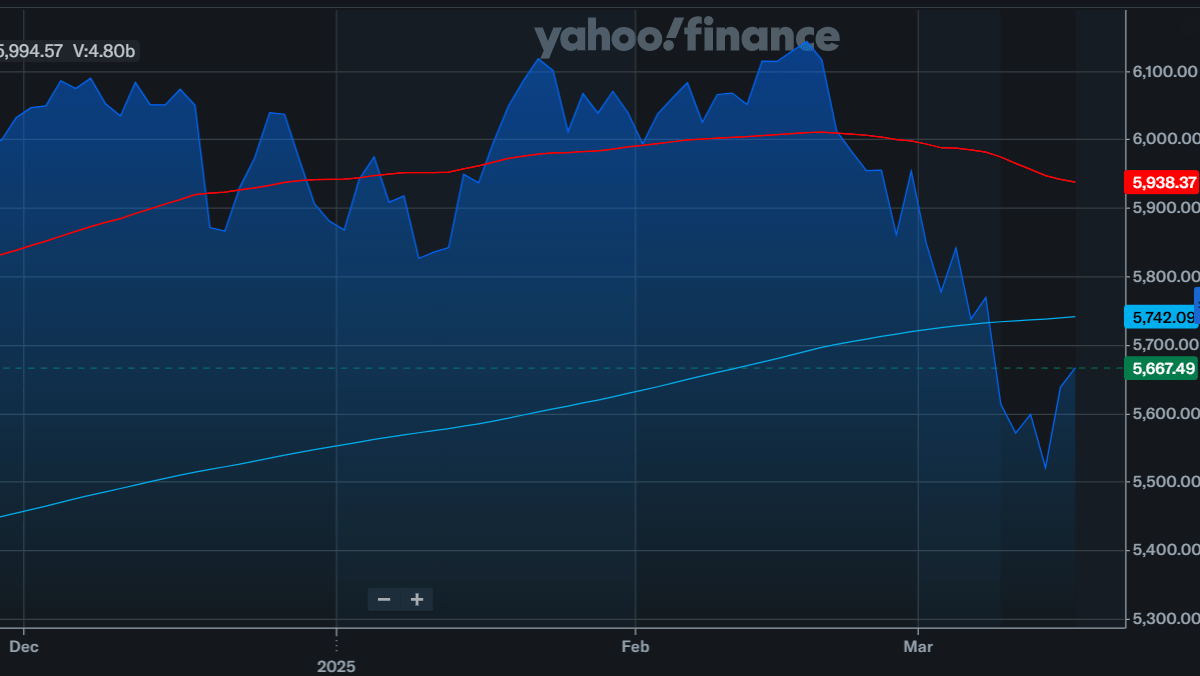- The Wealth Expedition
- Posts
- Emotional Intelligence and Investing
Emotional Intelligence and Investing
What part do our emotions play in investment success? How should that frame our outlook on market volatility when it occurs?

Our weekly newsletter features the following sections:
News
Paradigm Shift
Financial Tool
Here’s How I Can Help
First time reading? Subscribe for weekly content here.
“You don't have to have perfect wisdom to get very rich - just a bit better than average over a long period of time.”
-Charlie Munger

NEWS
What Happened Last Week
February’s unemployment rate ticked up to 4.1% from 4.0% the previous month.
More recently, the number of Americans filing for unemployment fell to 220,000, beating expectations.
Employers added 151,000 jobs in February.
Consumer spending, measured by core retail sales, fell month-over-month by -0.22% in February. This marks the second month in a row of reduced spending after January’s drop of -1.27%.
Inflation, measured by the Consumer Price Index (CPI), rose only 0.2% in February instead of the 0.3% expected rate. This annualized 2.43% rate is encouragingly approaching the Fed’s average 2% target.
While American household debt levels, as well as delinquency levels, have increased in recent months, debt service only came to about 11% of total disposable income near the end of 2024.
The Euro Zone, along with the UK, have not experienced the magnitude of downward movement that the US has these past few weeks. The MSCI EMU Index (Euro Zone) and the FTSE 100 (UK) are above even their 50-day moving averages.
How I See It
Fundamentals often change gradually. Sentiment changes on a daily basis.
Currently, we’re seeing fundamentals that continue to report healthy levels.
The US remains at full employment (unemployment of less than 5%).
Inflation has shown recent progress.
Money supply growth is unlikely to spur materially high inflation going forward.
Household debt still remains well within the range of sustainability for the average consumer.
Europe doesn’t appear to be pricing in a strong likelihood of a US recession.
These aren’t typically signs of an impending recession.
What could change things? Frankly, the sudden and heightened expectation of a recession.
If consumers really cut back on their spending, companies froze hiring, and bank loan growth rapidly declined, then this would be a very different story.
Fundamentals can actually be changed due to rapid, large and prolonged negative swings in investor sentiment, which changes habitual behavior.
Everyone’s talking about tariffs right now. But tariffs are among the least likely things, in my opinion, that would send the US into a recession at this point.
My main concern is the “this time it’s different” mentality of a high stock market that’s excused by the optimism of AI’s ability to boost growth through unprecedented levels of productivity.
The market really needs to take a breather, and that’s what it’s been doing so far in 2025.
A bear market is possible, of course, and more likely to begin during the first half of a US President’s term than the second half due to the uncertainty it often creates.
But in my opinion, recent market movement has all the hallmarks of a classic correction, which is much milder in magnitude and shorter in duration than a full-on bear market.
In the next few months, I suspect growth stock will outperform value as markets find their footing. But for long-term investors, a fairly equal split between growth and value in the middle of a bull market is an effective way to diversify away unnecessary risk.

PARADIGM SHIFT
Emotional Intelligence and Investing
The stock market stands at the intersection of fear and greed, ignorance and knowledge, and long- and short-term goals. These six factors are in a tug of war which moves the market, sometimes dramatically and quickly.
The closer we examine any one particular subject (the microcosm), the better we can understand the fuller subject of the whole (the macrocosm). In the same way, I believe the stock market can teach us a lot about ourselves and the world around us.
The stock market is perhaps the most powerful driver of wealth and advancement among an economy that’s ever been created. As a whole, it works magnificently to move otherwise stagnant capital to the most useful sectors of an economy. In this way, it drives the economy forward and carries the investor along with it.
But as renowned investor Ken Fisher likes to call it, the market is also The Great Humiliator.
It uses our human weaknesses against us. Almost everything about success in the market is counterintuitive to how we’re wired to act and react.
At its most basic level, it uses fear and greed as its two main weapons. And both are usually contagious! They compound as the emotions are picked up by more and more individuals.
To become a successful investor, emotional intelligence is key.
But here’s the challenge. Emotion easily disguises itself as logic. And that’s a tremendous illusion to attempt to overcome.
In its simplest form, in order to master the market, and investor must:
· Learn to recognize fear and greed in their own psyche.
· Learn to identify the common biases that work against the average investor.
· Become financially literate.
· Define the end goal, time horizon and preference for risk.
If there’s anything the stock market can teach us about life more generally, it is the virtue of humility and the power of open-mindedness.
The investor with a consistent process based on principles stands to make exponentially more over a lifetime than one which attempts to find the shortcuts.
In the end, if we will let it, the experience of investing can shape us into better individuals as we learn its lessons that can flow over into every other aspect of our lives.

FINANCIAL TOOL
Investor Sentiment
Dropping fast! That’s a market headline no one enjoys waking up to.
There’s no question that markets have been shaky over the past several weeks, and that often causes investors to pause and consider if now’s the time to jump out.
While there’s no unfailing hard-and-fast rule, there are several interconnecting indicators we can watch for signs.
The first is the speed of the drop.
The reason for market declines can be categorized into two broad reasons: sentiment and fundamentals.
Sentiment causes markets to drop fast and violently, because it’s driven by very short-term thinking. Now, some of these investors might have good reason to jump out. Maybe they’re very short-term focused. But most of the time, it’s just long-term investors making poor, knee-jerk reactions.
Fundamentals often cause markets to round off at the top, making slow and gradual declines over a few months as they try but fail to continue higher.
Sentiment is short-term. It usually reverses about as quickly as it starts. Psychology outruns fundamentals and often exaggerates due to the effects of Prospect Theory.
Fundamentals are often longer term. They are actual changes in economic realities that dramatically impact future earning potential.
For a recession to occur, which often is preceded by the start of a bear market, the magnitude of economic impact often needs to amount to trillions of dollars across the globe.
And here’s the other thing: the longer a recession is anticipated, the less likely it is to occur. Why? Because businesses and consumers have time to adjust and prepare.
Is recent volatility the start of a bear market? It’s still too soon to tell. But early signs show a steep drop of about 10% in a month’s time. That’s faster than a typical bear market begins but very much on par for a normal correction.
Is more volatility likely in the days ahead? Yes. The price of the S&P 500 is below its 50- and 200-day moving averages.

Source: Yahoo Finance
But here’s the good news.
Believe it or not, this volatility is not uncommon for the first year of a President’s term, especially a Republican President. Not because of bad decisions, per se. But simply for these reasons:
Enthusiasm for a business-friendly environment often inflates around the election date.
Immediate optimism tends to become more grounded in the inauguration year.
The Congress and the President often have stronger potential to make things happen before the mid-term elections, which creates temporary uncertainty and caution among investors and businesses.
None of these things are bad in and of themselves. Change, whether good or bad, is often reacted to with uncertainty and strong opinions. And the feeling of loss is felt more acutely than the equivalent feeling of gain.
It’s just the way the market perceives and deals with risk.
Those with long-term investment goals (think 5+ years) are often better to ride out volatility than to attempt to time the market and be wrong. Locking in losses just before a fast upward rally can be very costly, especially when considering the opportunity cost of lost compounded returns.
As I predicted a 2025 correction back on December 9, I will continue to monitor the market conditions for more telling signs of any developing bear market.


HERE’S HOW I CAN HELP
Launch Your Personal Wealth Expedition!
Ready to take control of your financial destiny?
Here are the two foundational courses which will set you on course to radically transform the way you live and work.

Budget, Build, Bridge: The Roadmap to Financial Independence
This course will lead you step-by-step toward developing your escape plan into a life of comprehensive wealth: time, flexibility, purpose and money.
Each lesson builds upon the last, covering these main topics:
Master high-impact budgeting techniques to create a surplus today.
Develop a plan to become debt-free in record time.
Raise your salary this year.
Use tax strategy to fast-track your goals.
Bridge your way to entrepreneurship.

Advanced Investing for Financial Freedom
Whether you're new to investing or a seasoned expert, this course is designed to make anyone a master of what I believe to be the most important investing concepts.
Here's what you'll learn in this course.
The foundational concepts for analyzing the risk and performance of mutual funds and ETFs.
How your goals affect the allocation of your investment portfolio.
How to fine tune the risk factors in your portfolio to weight the odds of success in your favor.
How to identify stages of the market cycle and build your portfolio around it.
How, when and why to hedge against downside risk.
How this all ties together as one comprehensive wealth expedition from ground zero to financial independence.
With investing, it often takes an understanding of just a handful of concepts to make all the difference in your ability to make tremendous wealth over time.
My goal with this course is to offer you what I see as the most important concepts to successful investing, setting you on course to achieve your dream life well in advance of retirement age using simple but powerful habits of finance.


I’d love to hear from you. Let me know what you’d like to see in upcoming newsletters, articles, or a digital course at Contact Us - The Wealth Expedition.
